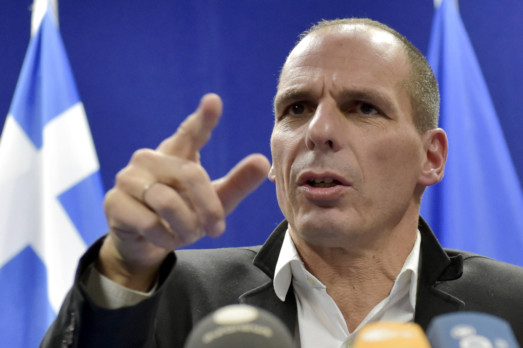
The optics of Thursday’s events in Europe, admittedly, were bad. Greece seems to have come crawling to its creditors asking for an extension of its current bailout — something it has resisted doing for weeks — only for Germany to arrogantly dismiss the request. [On Friday night, however, Greece secured a four-month extension to Eurozone funding].
Berlin believed Greece’s radical Leftist government is trying to weasel out of the bailout programme by asking for an extension of just one of the legal documents that frame it, instead of the whole package. As far as German Finance Minister Wolfgang Schaeuble is concerned, this isn’t a real compromise. And he had a point.
Here is what the letter Greece sent on Thursday to the group of finance ministers of euro area countries said:
“In this context, the Greek authorities are now applying for the extension of the Master Financial Assistance Facility Agreement for a period of six months from its termination, during which period we shall proceed jointly and making best use of given flexibility in the current arrangement, towards its successful conclusion and review on the basis of the proposals of, on the one hand, the Greek government and, on the other, the institutions.”
The agreement in question spells out how Greece’s funding is disbursed and repaid. It’s a lengthy legal document that makes no reference to any policy commitments Greece must make in order to receive the bailout funds. These were set out in separate programmes, which the Greek parliament approved to get the bailout funding released.
Last Monday, Greek Finance Minister Yanis Varoufakis talked to the Eurogroup about bridging Greece’s financial gap until a new bailout deal could be worked out. While signalling he wanted to keep the terms of the Master Financial Assistance Facility Agreement, he explained, in a speech whose text has since been leaked, which reforms his government planned to continue implementing and which it didn’t. He said he couldn’t commit to Greece’s previous privatisation promises because of collapsing asset prices. He also objected to his predecessors’ agreements on labour reforms and primary surpluses.
The Eurogroup, however, was resolved to hold Greece to the entirety of the previous deal, not just the part dealing with the disbursement and repayment of money. The wording of a draft Eurogroup statement that Greece apparently rejected on Monday referred to “the current programme”, not the Master Financial Assistance Facility Agreement.
This would explain Thursday’s statement from German Finance Ministry Spokesman Martin Jaeger: “The letter from Athens is not a substantive solution. In truth, it aims at bridge financing without the requirement to fulfil the programme. This does not meet the criteria approved by the Eurogroup on Monday”. Here is how Holger Schmieding, chief economist at Berenberg Bank, explained it in a research note Thursday:
Financial assistance
“Whether or not extending the ‘master financial assistance facility agreement’ comes close to asking for an extension of the ‘current programme’ is a matter which lawyers can discuss for ages. The financial assistance agreement itself does refer to full conditionality in its section about any disbursement of funds. But if Greece does not request any further disbursement of funds under the agreement, it may argue that it does not subject itself to full conditionality upon extending the loan agreement. The Greek request hence invites the interpretation that it wants to extend the assistance agreement solely as a basis for the ECB [European Central Bank] to keep Greece afloat.”
In other words, the German finance ministry failed to see what the government of Greek Prime Minister Alexis Tsipras is giving up. It still wants a new deal on its debt (which is not even under discussion yet) and it is still rejecting previously approved reform programmes. Extending the bailout agreement on such terms would simply give Tsipras more breathing space to seek a debt write-off, as he had originally intended. It would also give him a boost with the Greek electorate, which would undoubtedly be impressed with its government’s success in negotiating with the fearsome Germans.
Schaeuble and the other Eurogroup fin-ance ministers were not against giving Tsipras the six-month extension [Athens did in the end get a four-month extension on Friday], but they wanted assurances he will behave throughout that period as though he were someone else — for example, his far less radical predecessor Antonis Samaras. Putting the millstone of the previous programmes around Tsipras’s neck would have the added benefit of playing well with German and other Central European voters. German Economy Minister Sigmar Gabriel said on Thursday he was glad Greece was ready to negotiate, but it couldn’t be allowed to distribute the costs of its social policies to other countries in the euro area: “We can’t explain to Slovak citizens why the minimum wage in Greece is twice as high, but Slovak taxpayers should make transfers to Greece.”
Germany eventually made concessions to Greece on Friday to keep it in the euro area, but it was clearly determined to extract a price for its generosity. At the least, Berlin wants to force Tsipras and his team to give up most of their radical Leftist ideas — they may even want to drive them out of power in the process.
Contrary to the prevailing sense of urgency, there is time for more tug-of-war. “Deadlines are not firm in Europe,” Schmieding notes. So the ECB can still fund Greek banks and the country can hold off its creditors while talks with the Eurogroup continue. Expect more brinkmanship on both sides in the coming days — and more meaningful concessions from Greece.
— Washington Post
Leonid Bershidsky, a Bloomberg View contributor, is a Berlin-based writer.












